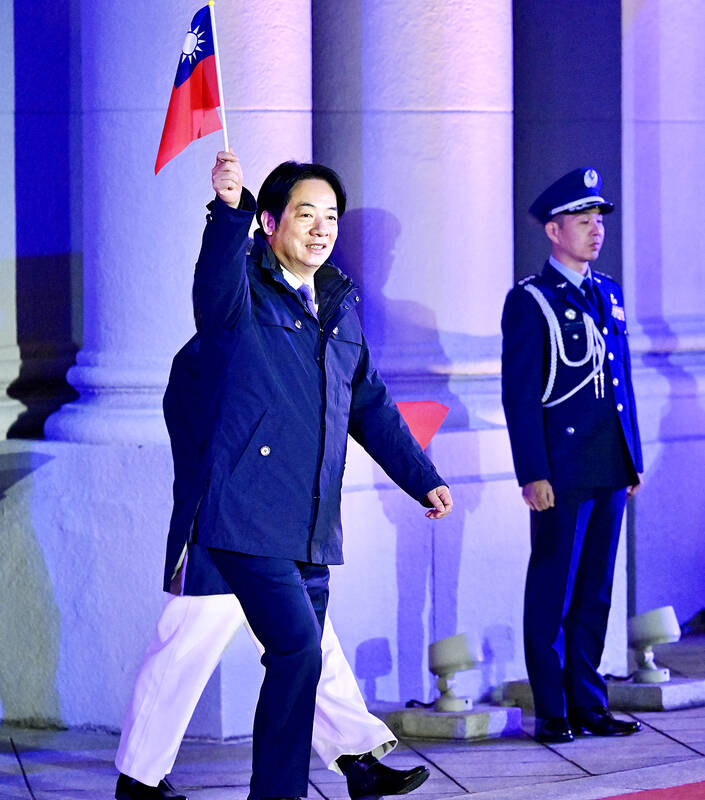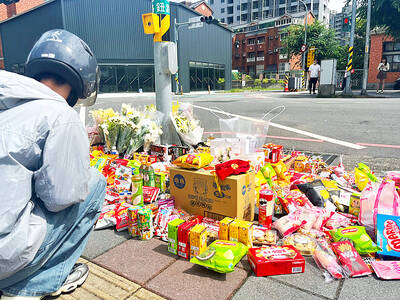President William Lai (賴清德) yesterday called China the “real barrier” to cross-strait exchanges and urged Beijing to hold talks with Taipei to ease tourism restrictions.
“The real barrier to cross-strait exchanges is actually China, not Taiwan,” Lai said, referring to Beijing’s restrictions on Chinese tourists visiting Taiwan, during a question-and-answer session at the Presidential Office in Taipei yesterday following his New Year’s Day address.
“If China is genuinely sincere, I suggest that the Taiwan Strait Tourism Association and the Association for Tourism Exchange across the Taiwan Straits begin negotiations” to ease those restrictions, Lai said.

Photo courtesy of the Taipei City Photojournalists’ Association
The associations were established by Taipei and Beijing respectively to facilitate coordination and negotiations on tourism.
The number of Taiwanese traveling to China for tourism or business was 2.05 million between January and November last year, while only 285,000 Chinese visited Taiwan during the same period, Lai said, citing government data.
The 2.05 million visitors were primarily individual travelers, as Taipei does not allow Taiwanese to travel to China in groups.
Lai criticized Beijing for barring Chinese students from pursuing degrees in Taiwan and for restricting tourism to Taiwan.
He made the comments after being asked about a pledge made by a Shanghai official during the Taipei-Shanghai Twin-City Forum last month that the Chinese city planned to allow its residents to travel to Taiwan.
Only residents from China’s Fujian Province are permitted to travel to Taiwan, but they are limited to Kinmen and Lienchiang counties.
As cross-strait relations remain strained and Beijing continues to refuse to engage in dialogue with the Democratic Progressive Party government, bilateral tourism has taken a hit.
During the news conference, which began with Lai’s New Year’s Day address that barely touched on cross-strait issues, the president also said it was “not worth it” for Taiwanese to apply for a Chinese identification card, which would lead to the revocation of their Taiwanese ID.
He was commenting on a video by a Taiwanese YouTuber who said that many Taiwanese had been encouraged to apply for Chinese ID cards, with about 100,000 having obtained the document.
The government would work to raise awareness of the issue to better prevent Taiwanese from being tempted by “short-term gains” and “going down the wrong path,” Lai said.
The Mainland Affairs Council has said it would look into the matter.
In Beijing, Chinese President Xi Jinping (習近平) in a New Year’s speech said that “no one can stop” unification with Taiwan.
“The people on both sides of the Taiwan Strait are one family. No one can sever our family bonds, and no one can stop the historical trend of national reunification,” Xi said in a speech televised on China Central Television.
Additional reporting by Reuters

Nvidia Corp yesterday unveiled its new high-speed interconnect technology, NVLink Fusion, with Taiwanese application-specific IC (ASIC) designers Alchip Technologies Ltd (世芯) and MediaTek Inc (聯發科) among the first to adopt the technology to help build semi-custom artificial intelligence (AI) infrastructure for hyperscalers. Nvidia has opened its technology to outside users, as hyperscalers and cloud service providers are building their own cost-effective AI chips, or accelerators, used in AI servers by leveraging ASIC firms’ designing capabilities to reduce their dependence on Nvidia. Previously, NVLink technology was only available for Nvidia’s own AI platform. “NVLink Fusion opens Nvidia’s AI platform and rich ecosystem for

WARNING: From Jan. 1 last year to the end of last month, 89 Taiwanese have gone missing or been detained in China, the MAC said, urging people to carefully consider travel to China Lax enforcement had made virtually moot regulations banning civil servants from making unauthorized visits to China, the Control Yuan said yesterday. Several agencies allowed personnel to travel to China after they submitted explanations for the trip written using artificial intelligence or provided no reason at all, the Control Yuan said in a statement, following an investigation headed by Control Yuan member Lin Wen-cheng (林文程). The probe identified 318 civil servants who traveled to China without permission in the past 10 years, but the true number could be close to 1,000, the Control Yuan said. The public employees investigated were not engaged in national

ALL TOGETHER: Only by including Taiwan can the WHA fully exemplify its commitment to ‘One World for Health,’ the representative offices of eight nations in Taiwan said The representative offices in Taiwan of eight nations yesterday issued a joint statement reiterating their support for Taiwan’s meaningful engagement with the WHO and for Taipei’s participation as an observer at the World Health Assembly (WHA). The joint statement came as Taiwan has not received an invitation to this year’s WHA, which started yesterday and runs until Tuesday next week. This year’s meeting of the decisionmaking body of the WHO in Geneva, Switzerland, would be the ninth consecutive year Taiwan has been excluded. The eight offices, which reaffirmed their support for Taiwan, are the British Office Taipei, the Australian Office Taipei, the

DANGEROUS DRIVERS: The proposal follows a fatal incident on Monday involving a 78-year-old driver, which killed three people and injured 12 The Ministry of Transportation and Communications yesterday said it would lower the age for elderly drivers to renew their license from 75 to 70 as part of efforts to address safety issues caused by senior motorists. The new policy was proposed in light of a deadly incident on Monday in New Taipei City’s Sansia District (三峽), in which a 78-year-old motorist surnamed Yu (余) sped through a school zone, killing three people and injuring 12. Last night, another driver sped down a street in Tainan’s Yuching District (玉井), killing one pedestrian and injuring two. The incidents have sparked public discussion over whether seniors